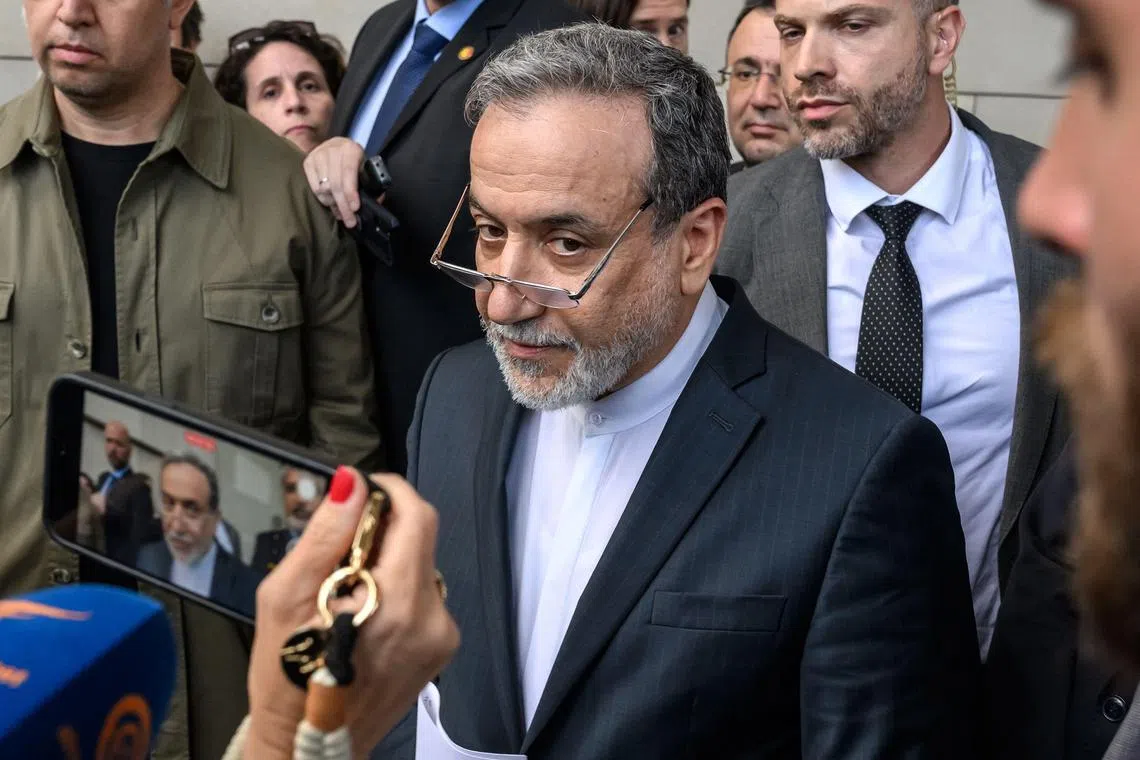Europe-Iran talks yield little in Geneva at ‘perilous’ moment, ministers ready to meet again
Sign up now: Get ST's newsletters delivered to your inbox

British foreign minister David Lammy (left) and French Foreign Minister Jean-Noel Barrot briefing the media in Geneva on June 20, after their talks with Iran's Foreign Minister on Tehran's nuclear programme.
PHOTO: AFP
GENEVA - There were few signs of progress after European foreign ministers met their Iranian counterpart on June 20 in a bid to prevent conflict in the Middle East from escalating, although all signalled readiness to keep talking, despite major sticking points.
The foreign ministers of Germany, Britain, France - known as the E3 - plus the EU, urged Iran to engage with the United States over its contentious nuclear programme even as Tehran has repeatedly insisted it will not open discussions
The talks aimed to test Tehran’s willingness to negotiate a new nuclear deal despite there being no obvious prospect of Israel ceasing its attacks soon, diplomats said.
“The Iranian Foreign Minister has expressed his willingness to continue discussions on the nuclear programme and more broadly on all issues, and we expect Iran to commit to the discussion, including with the United States, to reach a negotiated settlement,” said French Foreign Minister Jean-Noel Barrot.
For his part, Iranian Foreign Minister Abbas Araqchi said Iran was ready to consider diplomacy once Israel had ceased its attacks and been held accountable for its actions.
“In this regard, I made it crystal clear that Iran’s defence capabilities are not negotiable,” he said, following the talks lasting around three hours in Geneva.
No date for a follow-up meeting was announced despite Europeans underscoring the small window for diplomacy.
US President Donald Trump has said he will decide within two weeks
European ministers spoke beforehand with US Secretary of State Marco Rubio who signalled Washington was open to direct talks even as it mulls the strikes, diplomatic sources said.
Washington did not confirm that, though broadcaster CNN quoted a US official saying Mr Trump supported diplomacy by allies that could bring Iran closer to a deal.
Britain’s foreign minister David Lammy said the European countries were eager to continue talks with Iran.
“This is a perilous moment, and it is hugely important that we don’t see regional escalation of this conflict,” he said.

Iranian Foreign Minister Abbas Araghchi leaving after his meeting in Geneva with the foreign ministers of Germany, Britain, France - known as the E3 - plus the EU.
PHOTO: AFP
Two European diplomats said the E3 did not believe that Israel would accept a ceasefire in the near term and that it would be difficult for Iran and the US to resume negotiations.
They said the idea was to begin a parallel negotiating track, initially without the US, on a new deal that would involve tougher inspections, and potentially on Iran’s ballistic missile programme, while allowing Tehran some notional enrichment capacity.
Enrichment differences
The Trump administration is demanding Iran stop uranium enrichment altogether, whereas the E3 have in past talks left it some scope to enrich for civil ends in exchange for extremely strict international inspections.
On June 20, French President Emmanuel Macron shifted closer to Mr Trump’s position, saying that any new deal with Tehran needed to go towards zero enrichment.
A senior Iranian official told Reuters Iran is ready to discuss limitations on its uranium enrichment but said the prospect of zero enrichment would undoubtedly be rejected.
In a speech at the United Nations in Geneva before the E3 meeting, Mr Araqchi accused Israel of a “betrayal of diplomacy”, while Israel’s envoy in Geneva raised a “vehement objection” to the minister addressing the UN’s Human Rights Council.
Geneva was the scene of an initial accord between Iran and world powers to curb its nuclear programme in return for sanctions lifting in 2013 before a comprehensive deal in 2015.
Separate talks between Iran and the US collapsed when Israel launched what it called Operation Rising Lion
France’s Mr Barrot spoke to Mr Rubio on June 19, during which Mr Rubio said Washington was ready for direct contact with the Iranians, a diplomatic source said.
The Europeans wanted to make clear to Iran that the US is ready for direct talks, but that Iran must give a serious signal, two diplomats said, without defining what that could be. REUTERS


